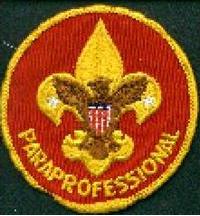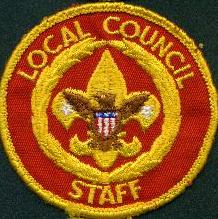Paraprofessional

From: Mike Walton
Via: Scouts-L Youth Programs Discussion List

Paraprofessional badge of office...this is the one I wore proudly for over three years...
Chris in Houston wrote and asked:
Paraprofessionals?
Yep. While the BSA on a national scale *frowns on them*, many Councils *employ them* as stop-gaps, particularily in hard-to-hire areas of their Council's territory and for hard-to-manage Council programming.
In the fictional "Cardinal Council" 's case, the Council has five such employees:
*two working with a District operation in a metro city environment
*one working with Venturing (was Exploring)
*one working with Programming and
*one working as a camping assistant
Depending on their level within the Council, they either wear the Paraprofessional badge of office, the Local Council Staff badge of office, or the District Executive Statf badge of office.
Bob Taylor (and several other Scouters, including Chris in Houston) wrote and asked questions similar to Bob's:
Mike--you used to be a "Para-Professional"? does that position still exist? if so, where does that position fit in the council structure? can you supply ball park figures for the various jobs?
Officially, *today*, the BSA folks at the Council Support Division *frowns very heavily* on ANY Council hiring part-time or temporary *field employees*, which the BSA defines as "Paraprofessionals". But they ARE needed, now as back in my day (the late 70s/early 80s).
I'm not talking about the office staff...the few secretaries, the Registrar nor the people manning Council Trading Posts. Nor am I talking about the summer camp staff, even though some Paraprofessionals are found as Program Directors or Associate Camp Directors at some camps.
These men and women -- parapros -- work within our Districts and in support of Council programs.
Officially, Paraprofessionals are authorized when a Council's Scout Executive deems them to be of value to their operation. A paraprofessional, like a professional, comes in "several shades" depending on the amount of compensation and scope of responsibilities of the person.
Most Councils hire what is called a "program coordinator" or "neighborhood coordinator". This person works under the supervision of a District or Council professional (usually a District Executive or Field Director) and under their direction. Mostly it's "O and E" (organization and extension, the two biggest roles of a field professional, closely followed by C and R, cultivating and raising monies).
Some Councils hire Paraprofessionals to lend their services to programs like Venturing (Exploring) or Learning for Life/Career Awareness programs. These "program specialists" assist the Director or Executive in managing those programs over a county or within several school systems.
In some Councils, a volunteer may be chosen to serve as a District Representative. Those individuals do many of the same things that professionals do, and are under the supervision of a Senior District Executive, District Executive multiple-person, or District Director. This person may be the ONLY "field person" out there. Direct Service, Far East and Transatlantic Councils also use "DRs" to serve as interim District Executives until such time the Council feels that the District can "support" (financially, that is) a fulltime field executive.
In other Councils, a volunteer serves as a Paraprofessional Executive (note the word "executive"), and is given responsibilities to manage a part of or an entire District. The title basically states that he or she is "acting as" a DE, again, under the strong guidance of a middle manager within that Council, or in some Councils, under the direction of the Council Scout Executive him/herself. In order to get this far up the "ladder" so to speak, a Council Scout Executive and indeed a Council must have a lot of confidence in their abilities to manage, work with others and raise the monies needed to support Scouting in that part of the Council's territory. Most Paraprofessional Executives are either entered into or are already in the Council's "professional preview program", a "fast track" toward being hired as a fulltime District Executive in that Council or some other.
In my "Cardinal Council" example previously, I explained that in this case, the Council employs several parapros to do a wide range of jobs. I based those positions on the actual positions I held in five local Councils during my Paraprofessional tenure of service. In YOUR Council, unless you are from Chicago, New York, Los Angeles, Seattle, Dallas/Fort Worth, Orlando, Miami, St.Louis, Kansas City, Denver, Salt Lake City, or Atlanta, you may only see ONE paraprofessional, generally a college student working a semester or two...
(Ouch! Sorry...I left out Indianapolis, Cincinnati, Boston and two of the places where I worked, Nashville and Louisville!)
Why don't Councils use MORE parapros? Money. If you can get work from two paraprofessionals for the same compensation you're paying a District Executive, "why hire the District Executive"? This is why in some Councils, it's hard for that entry-level professional to "go anywhere....because instead of hiring the pro, the Council, needing to cut expenses, would hire a parapro for a short period of time". This is why National strongly encourages local Councils to hire FULL TIME employees to do professional-technical work and hire PROFESSIONALS to do all field work in their Councils.
Paraprofessionals do NOT have to meet the same educational requirements, but they DO have to meet the same character, registration and leadership requirements as all other professionals.
I replied to Jason Cruse in a separate posting:
Jason:
The person who tried to hire you (you would have made a GREAT Parapro, by the way!!! *smiling*) was right on track in explaining why some Councils "resort" to hiring Paraprofessionals:
BSA is, quietly, having difficulty recruiting professionals, as well as keeping DEs beyond their first year (the rate of retention of DEs from their first professional development course to their second: in other words, the number of DEs that last more than one year, is WELL below 50%....I have some ideas of why this is the case, but....)
Me too, Jason...but I don't want to go there either...
ANYWAY...Paraprofessionals are, in essence, part time professionals. There are esstential tasks that need to be done in each district. In districts that are large enough to merit more than one DE, but the council can't afford it, or in districts where the council is having trouble recruiting a DE, BSA hires a paraprofessional to assist or to perform essential functions until a DE can be hired.
The key word there, gang is "ESSENTIAL". Remember the phrase "never do something that a boy can do"? It applies here too; "never do something that a volunteer can do". Only those essential tasks which SHOULD only be handled by an executive, should the Paraprofessional do. His or her job, like all other field executives, is to teach and coach and demonstrate through personal example, those tasks which CAN and in many locations ARE being done by volunteers.
As a adult volunteer, I've been fortunate as a result of my family's and later my military experiences to have served in eleven local Councils, with positions ranging from District member-at-large to Council Commissioner; and service on three Area, two Regional and three National volunteer committees of the BSA.
I was also blessed to have worked alongside my Scouting mentor and former Area Director in Kentucky and Tennessee, William Joe Woodall as a Paraprofessional for three and half (three weeks and two days lacking the fourth year) in the eastern parts of those two states and parts of two other states. It was an experience that I regard the best of any job I've ever had...including the military ones!!
I've been able to be in "the right places doing the right things" and in the process, have met a lot of the BSA's senior and middle-level managers earlier in their careers as Field Directors or District Executives/Exploring Executives. That's a great thing, because of many of them, I've been able to answer some of your harder questions here (and to shed some light since the BSA cannot OFFICIALLY have representation here on our (or any other list). As noted, I sometimes don't get it *exactly right* but I try....
I was given camp duties and worked at Camps McKee and Blanton as part of my preprofessional experiences. I worked alongside the Program Director and it was a great experience for me. Because I attended the National Camping School for conservation-environment directors in the past, I later got to serve as Conservation Director while at camp. I can use that experience and the work alongside of volunteers and Scouts in working with my District. As I've stated here in the past, Summer Camp is a "mini community" and allows Scouts and Scouters to truly experience the ideas of citizenship, character and personal fitness development.
Craig Brown wrote and asked me:
I noticed on your resume that you were a para-pro in the tri-state area of Tn-Ky-Va from 1978-81:
Yep. I was hired as a Regional Paraprofessional under a joint BSA/CETA (now called JTPA) project. I served in several Councils, including yours during my tenure. I worked under the supervision of several professionals, but the lead professional who signed my final evaluation was the former Area Director of Area Two, Southeast Region (W.Joe Woodall).
1. Exactly what communities in Tennessee did you serve?
I served the Tri-Cities area (with a desk in Johnson City, TN)...
The counties I worked in were Sullivan, Washington, Unicoi, Hawkins and
Greene. Mostly I worked in Washington and Sullivan counties and sometimes
in Hancock County.
Later, I served in west Knox and Anderson countries.

Local Council Staff badge of office...this is mine as I wore it while working in several local Councils...
2. What council did you work from?
My first assignment was in the Lonesome Pine Council, Pikeville, Kentucky, working within the Mountain Laurel District from Middlesboro, Kentucky. I worked next in Wise, Virginia and then in Johnson City, Tennessee (Sequoyah Council) to fill the gaps from quitting Parapros. I worked next in northeastern Tennessee out of Jellico, and then back up to Lexington, KY and a District out of Jackson, Kentucky. I went next to Louisville, working innercity west-end of that city and finally to the "microcity" of Lexington, Kentucky. My last assignment was with the Sciota Area Council in Maysville, Kentucky.
3. Did you ever hear of a Camp Sequoyah on Norris Lake in LaFollette, Tn?
Yeah...I didn't work there; I had to work at McKee Scout Reservation for a summer...I was supposed to work at Camp Blanton, but when the Council merged with Bluegrass, I was given the new assignment of working the "urban side" of things.
Actually, what happened was as the number of Paraprofessionals dropped (everyone "wanted to work with kids" but nobody wanted to "raise monies or start new units" (which was the purpose), those few of us who did stick it out were reassigned to areas that the grants were based upon.
 Teaching/Coaching tools
Teaching/Coaching tools
 Leaders' Online
Leaders' Online
 The Tree
The Tree
